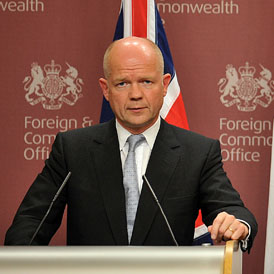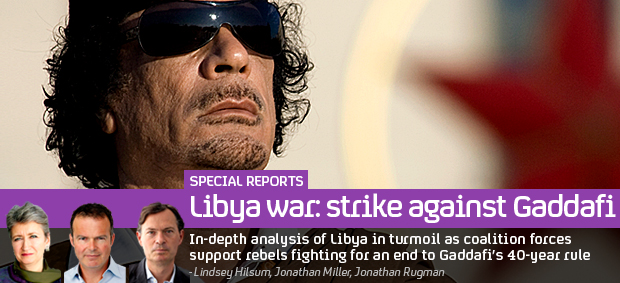Pragmatism rules in Libyan stalemate
As the Foreign Secretary, William Hague, offers the prospect of Colonel Gaddafi being allowed to stay in Libya if he steps down as leader, Anthony Tucker-Jones reports on the shifting political sands.

Pragmatism seems to be increasingly the name of the game over securing a settlement in conflict-torn Libya. Britain and France are now saying the fate of Colonel Gaddafi is a matter for the Libyans to decide.
Britain’s Foreign Secretary, William Hague, signalled that if Gaddafi steps down, he may not have to leave. This seems to be a change of policy, as the UK had previously stated he must go.
Despite 40 nations, including Britain and America, recognising the Transitional National Council (TNC) as the legitimate authority in Libya, with the promise of millions of dollars of frozen Libyan assets – Gaddafi remains entrenched as ever in Tripoli.
Behind the scenes amongst the NATO allies there is a sense of intervention fatigue. This is adding to a growing urgency in finding a negotiated solution, especially if the rebels cannot force the issue by weight of arms alone.
Behind the scenes amongst the NATO allies there is a sense of intervention fatigue.
Earlier this month William Hague said, “It is time that is against him [Gaddafi], it is not time that is against us. These [military] operations are sustainable indefinitely.”
This increasingly looks not to be the case following yesterday’s Anglo-French press conference.
“Gaddafi must leave power,” said Mr Hague. “What happens to Gaddafi is ultimately a question for the Libyans.”
Nonetheless, both the British and the French while wanting to show flexibility, appear to be adopting a best-of-both-worlds approach.
The Foreign Secretary’s comments came after a meeting in London with his French counterpart, Alain Juppe. Reportedly the French are becoming especially impatient with the pace of progress.
Mr Hague went on to say: “Obviously him leaving Libya itself would be the best way of showing the Libyan people that they no longer have to live in fear of Gaddafi.
“But as I have said all along, this is ultimately a question for Libyans to determine.”
The TNC also seems to be softening its stance and is becoming more flexible on the possibility of Gaddafi remaining in Libya.
“Gaddafi can stay in Libya but it will have conditions,” said Mustafa Abdel Jalil, Chairman of the TNC, adding: “The same conditions will apply to his family.”
However, should peace be secured at the cost of Colonel Gaddafi remaining in Libya and the country partitioned?
The argument is that, if Gaddafi steps down then negotiations between his supporters and the TNC can begin, with a view to elections being held and old wounds healed.
The plan seems to be to let Gaddafi step down and they can worry about him after a ceasefire, peace settlement and elections have been arranged.
The crunch, though, is that the Libyans will not only have to determine whether they are content for Gaddafi to stay, but also whether partition would be a only temporary measure.
The reality is that western and eastern Libya is divided along tribal, political and cultural grounds and regardless of elections these rifts would remain in place.
War crime charges
Certainly Gaddafi loyalists will want to avoid reprisals and handing Gaddafi over to the International Criminal Court in The Hague. To ensure this they will want some form of autonomy in the areas they still control.
If Gaddafi is allowed internal exile does that mean he escapes his war crimes charges?
This would be in violation to the ICC’s arrest warrant for Gaddafi, his son – Saif al-Islam – and Abdullah al- Senussi, his security chief.
The opposing parties could end up with a political fudge similar to Bosnia, where the Bosnian-Serbs enjoy de facto autonomy from the Bosnian-Muslims in Sarajevo, with the ever present danger of them ceding from the uneasy union.
Admiral Mike Mullen, the Chairman of the US Joint Chiefs of Staff, observed yesterday that NATO was in a state of “stalemate” in Libya. Clearly Britain and France agree with him and are desperate for Libya to finally reach a tipping point.
The message seems to be: “Let’s forget Gaddafi he is an irrelevance and move forward.”
Anthony Tucker-Jones is the security and terrorism correspondent for “intersec – The Journal of International Security” as well as a regular commentator for defencemanagement.com
